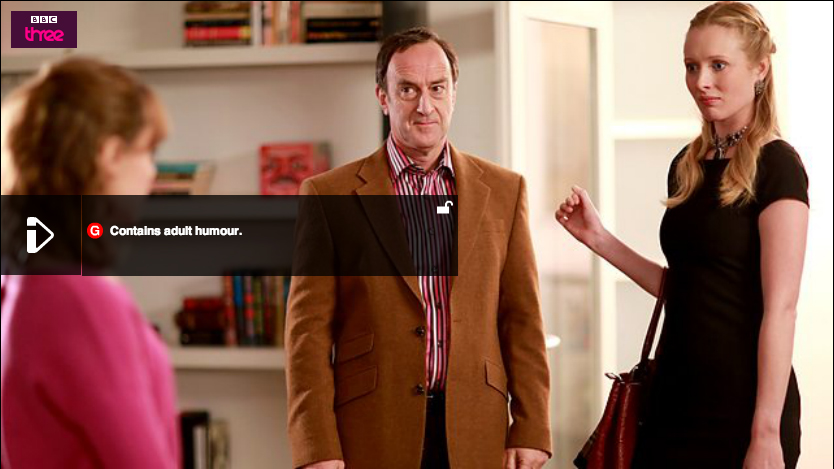Stop worrying and push the red button: BBC Three on iPlayer is just the start
Terrestial TV's loss is iPlayer's gain

Sign up for breaking news, reviews, opinion, top tech deals, and more.
You are now subscribed
Your newsletter sign-up was successful
Anyone getting upset about having to use a tablet to watch Snog, Marry Avoid is going to have a rough couple of years - the iPlayer model will become the norm, not the exception for shows with anything other than mass appeal.
The axe has fallen and BBC Three will be going online-only in 2015. Faced with saving £100 million, BBC Director General Tony Hall has decided that it would be better to cut out one underperforming channel rather than inflict the cuts across the BBC and harm programme quality on all channels.
The move has generated a predictably mixed reaction. Defenders of the more upmarket (let's gloss over the 70s TOTP reruns and focus on the Jonathan Meades and Scandi-Noir stuff) BBC 4 have been pleased to see that its highbrow mix of documentaries and subtitled drama will get a stay of execution over the youth-focused BBC Three.
But others have noted that BBC Three has worked well as an incubator for new comedy writing, with notable success stories including hits like Little Britain, Gavin & Stacey and Him & Her. If you are among those getting upset about your favourite shows moving online, however, prepare for a tough few years - this is likely just the start.
Niche vs mainstream
The ratings for BBC Three's home-produced programmes are fairly low compared to mainstream channels and on a par with niche or pay-TV outlets like Dave or Sky Atlantic.
BARB viewing figures typically show only one home-produced BBC Three show troubling the top ten per week - recently this would be something like Sun, Sex & Suspicious Parents around the 6-700,000 viewer mark - with every other slot dominated by imports like American Dad or Family Guy.
That's not to say that BBC Three's shows are worthless. For all the sniggering about downmarket titles like the aforementioned Sun, Sex &... or Snog, Marry Avoid the shows themselves were often more nuanced than their equivalents on rival channels and there is an audience for them - just not a huge one. Moving these shows online could be a good solution to the problem.
Sign up for breaking news, reviews, opinion, top tech deals, and more.
The target audience is exactly that which watches online more than via broadcast TV and the shift could allow the BBC to fulfill its public service commitment to producing quality TV for young people.
iPlayer isn't some digital backwater, either. February saw the service's biggest month to date with some 315 million programme requests, up 16% from the previous year.
The BBC knows this and even before the BBC Three announcement has been working on a revamp of the service that will see more original programming premiering online and just last month the BBC Trust approved plans to allow viewers to buy shows from a future iPlayer download store.
In other words, moving BBC Three online fits exactly with changes that were already coming to the BBC's online services. The only thing that has changed is the time frame. As BBC Director of Television Danny Cohen told 5 Live, "In an ideal world we would not be taking BBC Three online in 18 months' time, we would probably do it in three or four years time."
It is possible that the BBC Trust might decide against closing the channel, as it did with digital radio station 6 Music back in 2010 following a successful campaign by fans. Even so, it looks inevitable that its future - and likely that of BBC 4 - will eventually be online.
Smarter TV
'Smart TV' sales may have stalled but the ideas behind smart TV are sound and not going away. Broadband speeds are now fast enough to deliver video content to the majority of homes and doing so would seem to make economic sense when compared to broadcast, particularly for programmes with more niche appeal.
Over time more and more of what we now call TV will migrate online and through a combination of set-top boxes, smart TVs, tablets and other gadgets like Apple TV, Roku and Chromecast it will be easier than ever to watch that way.
Programmed TV may not go away entirely but the days of the whole country watching together and having are over and are not coming back barring certain Event TV landmarks. This doesn't have to be a bad thing.
Video on demand services like Netflix, Amzon Prim Instant Video and, yes, iPlayer are growing in popularity with more ways to watch and more things worth watching than ever before. Online is a place where seemingly niche shows can find their audience and what may seem of too minority an appeal could be more workable.
Look at something like Ripper Street - an underperforming show that was axed from BBC1 and would, in previous years, have been doomed has been given a second chance via Amazon's in-house production company. The new BBC co-production will premiere online and then move to terrestrial TV at much lower cost to the licence payer.
The 'incubator' aspect of the channel would also work online. The BBC already pilots some new shows on iPlayer first and it was announced last July that all new BBC Three comedy would hit iPlayer before broadcast TV.
It would be a shame to lose the communal aspect of broadcast TV but curated playlists or a rolling 'broadcast' stream via iPlayer could provide the same experience and the BBC is probably the organisation best placed to provide it.
It's time to stop worrying and push the red button.